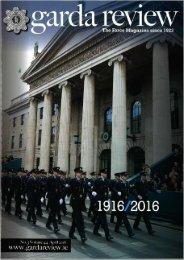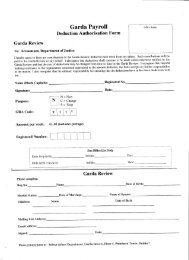Conference Report 2016
Table of contents contains links on page 5. It can be used to skip through chapters.
Table of contents contains links on page 5. It can be used to skip through chapters.
Create successful ePaper yourself
Turn your PDF publications into a flip-book with our unique Google optimized e-Paper software.
Section 1: Pay and Allowances<br />
The ‘unique’ Characteristic in Perspective<br />
3.18 Regardless of the function of an individual member<br />
of the force, it has been established that the role of<br />
the police officer is unique within our society. The<br />
Desborough Committee (1919) concluded:<br />
“...a policeman has responsibilities and obligations<br />
which are peculiar to his calling and distinguish him<br />
from other public servants and municipal employees<br />
and we consider the police entitled thereby to<br />
special consideration in regard to their rate of pay<br />
and pensions...the burden of individual discretion<br />
and responsibility placed upon a constable is much<br />
greater than that of any other public servant of<br />
subordinate rank.”<br />
3.19 Thirty years later the British Oaksey Committee<br />
(1949) endorsed this judgement. It was also<br />
subsequently upheld by a British Royal Commission<br />
(1962). This Commission concluded that the police<br />
officer is:<br />
“...answerable to his superiors for any disciplinary<br />
lapse and to the courts for any misuse or abuse of<br />
authority. Thus either when acting alone, on his own<br />
initiative or when acting under orders, he is himself<br />
answerable for any error of judgement<br />
...vigilant both to use his authority adequately and<br />
instantly as occasion demands, and at the same<br />
time never to exceed it. We are satisfied that this<br />
individual responsibility is more onerous than any<br />
delegated to, or assumed by, a member of any<br />
comparable profession or occupation.<br />
Responsibility of this kind, to be properly and<br />
reasonably exercised, demands high moral<br />
standards and a nice exercise of judgement.”<br />
3.20 In a subsequent publication, from the Harvard<br />
University Press (1968) Professor Wilson made the<br />
striking, though accurate, observation that the<br />
police force has the “special property that within it,<br />
discretion increases as you move down the<br />
hierarchy”.<br />
3.21 By 1970 the Conroy Commission had broadened the<br />
perspective on the unique nature of the job,<br />
describing it as:<br />
“…a way of life... a vocation. A policeman’s duty has<br />
first claim on his time. His wife, family and social<br />
relationships take second place...Without any, or<br />
any adequate, prior notice he may be called on to<br />
serve long hours of duty or he may be liable to have<br />
his leave stopped owing to an emergency. He is<br />
exposed to the risk of assault and of personal injury<br />
in the performance of his duty...Liability to transfer<br />
is a feature of a policeman’s life...On transfer, his<br />
children have to change schools with a possible<br />
detrimental effect on their education. His wife and<br />
family lose their circle of friends and have to start<br />
afresh in a new environment.”<br />
3.22 When the Ryan Committee of Inquiry reported (1979)<br />
it also addressed (in considerable detail) this<br />
‘unique’ character of the job:<br />
“We accept the uniqueness of the Garda function. It<br />
was recognised by the Conroy Commission and<br />
taken into account in its recommendations. Special<br />
qualities are needed to make a good policeman and<br />
the conditions of employment have many special<br />
features, which are not found in outside<br />
employment.<br />
“The Garda must have certain physical attributes.<br />
He must have attained a level of education that will<br />
enable him to undertake a job in which intellectual<br />
as well as physical skills are required. In the course<br />
of his duties he will be called upon to familiarise<br />
himself with a large and complex body of law and<br />
must be able to apply it to different situations.<br />
“Temperamentally, if he is to make a good<br />
policeman, he must be able to combine a firm<br />
38th Annual Delegate <strong>Conference</strong><br />
25




